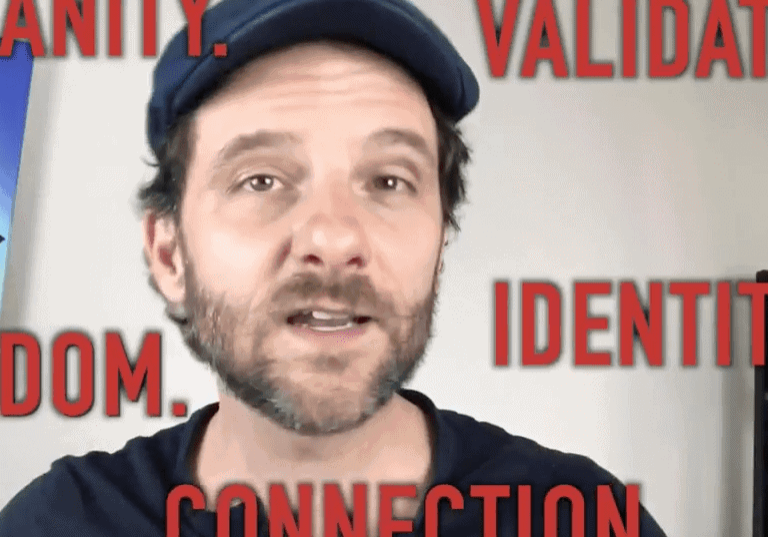♦◊♦
A few years ago, I was shocked to discover I’d spent a lifetime (unknowingly) allowing one especially critical boundary to be violated by the women I loved, over and over.
Naturally, I routinely violated this same boundary for them, too.
Had I been aware (and able to stand for this boundary) I’m convinced! I would have been able to actually enjoy relationships, rather than fear them as the nightmares they inevitably became.
Sadly, it didn’t occur to me that I – a man – should even have boundaries, except the “obvious” ones of course.
For the shallow-masculine world around me insisted there were basically only 3 ways a woman could violate me:
- She cheats on (lies to) me
- She disrespects (rejects) me
- She takes tangible resources (money, things, time) from me without my permission.
That’s it.
Otherwise, I was completely sold into the (absurd) idea that a man is supposed to be tough, invulnerable, invincible, able to “handle” (whatever that means) anything difficult that comes his way … least of all a woman!
Boundaries? … Women need boundaries. Not me! (so I thought)
Thus I swam for decades in the deep, mysterious oceans of intimate relationship, blinded and unprotected from all kinds of painful boundary violating behavior, from the subtly upsetting (testy mermaids nipping at my toes) to the excruciatingly painful (great white sharks roaring up from the depths to swallow me whole as I thrashed about desperate for survival!).
But there was one specific boundary violation that kept happening over and over, and I’ve seen it since, countless times as a Relationship Coach the last 7 years. This unassuming little sea creature has a thousand microscopic spiny needles that quietly inject poison into intimacy, rotting out from the inside all feelings of trust and safety.
This is that one boundary violation:
When one partner assumes, with near or complete certainty, that they know what the other is thinking or feeling, or what they should be thinking or feeling.
Today, as a relationship coach, a significant part of my work is teaching people how to create and maintain healthy boundaries in ways that leave both partners feeling heard, honored, and respected.
Whether I’m working with individuals or couples, we’ll work through all variety of boundary issues, from porn to infidelity, from work-life imbalances and co-dependency, to commitment confusions and all the ways one might give their power away to the world around them.
But this one boundary violation shows up in every relationship dynamic.
Here are ways in which it emerged from the mouths of my past loved ones, and from my mouth, too:
“You don’t really care about me.”
“You obviously don’t want to spend time with me.”
“You clearly want to be with someone else.”
“You should never have done X because I sure wouldn’t have done X!”
“You obviously don’t know what’s best for you.”
“You are clearly not as spiritual/aware/conscious/wise/mature as I thought you were.”
“You shouldn’t feel X; it doesn’t make any sense.”
“You only did X to satisfy your ego.”
“You don’t care about X as much as I do.”
… and on and on.
Notice these all start with “You” – though they can be cleverly disguised by the conniving ego as “I” statements, too: “I don’t feel like you care about me.”
Regardless, these are all conclusive declarations that, “I know what you’re thinking or feeling (or should be).”
Here’s a more revealing way of saying the same thing:
“I can’t see, hear, or feel the real you right now because the conclusions I’m creating in my mind about you are in the way.”
How’s that going to inspire connection? It can’t, and never does.
What it more commonly does is incite defensiveness, confusion, anger, resentment, shut down, withdrawal, disconnection.
Today, I understand my partner (or I) would only ever say such things out of pain and fear, when she, herself, feels deeply unseen or heard; when she’s desperate for loving reassurance that I will hold her experience/feelings/perspective as valid and won’t leave her alone in the pain.
I never knew that before.
It still sometimes crushes me to look into my past, to see with more mature eyes the anguished faces of women I was trying to love. I can see now both the anger and the sadness in their eyes, betraying a profound ache to feel seen and heard by me.
Yet in the face of desperate attempts to have certainty, by insisting they knew my agenda – my thoughts and feelings, my why’s, my inner world – all I could ever do was react poorly, defensively arguing for the right to exist. As if my entire being would be swallowed up by their conclusions that I knew missed the mark.
Here is what I should have done, instead – an effective 2-step response that would have saved us both:
1. Respectfully, lovingly, stand up for this boundary:
“Please stop saying you know what is true for me (what I’m thinking, or what I’m feeling). I’m not going to continue this conversation until you stop, and allow me the space to have my own experience.”
2. Offer the reassurance she’s really seeking.
“I really get that you’re hurt (upset, mad, scared, confused, etc.). I’m here with you, and we’ll figure this out together.”
Because I’ve been practicing this for years now, and teaching this to my clients, I know what can happen next: Genuine curiosity and moments of real connection.
PRACTICE
Notice the next time someone – whether intimate partner, friend, colleague, or family member – makes an assertion that they know what you’re thinking or feeling (or what you SHOULD be).
This could reveal itself in a thousand ways:
“You should want to go to X with me.”
“You clearly did X because you’re inconsiderate/ignorant/ashamed/confused/insensitive …”
“You should feel ashamed/embarrassed/disgusted/happy/relieved ….”
“You should see this from X perspective.”
“Why are you single?” (no one ever asks: “Why are you in a relationship?”)
To be sure, sometimes people can actually be helpful when offering different perspectives, for example. Often, though, it’s not string-free “help” they’re offering; rather, they’re attempting to enroll you in their own worldview so they don’t feel so alone in it, themselves.
Regardless, if it doesn’t feel helpful, don’t attempt to defend yourself by trying to convince them of what you’re thinking or feeling. Instead, simply ask them in this very moment not to assume they know what is (or should be) happening for you.
If you’re not too emotionally charged you might thank them for trying to offer insight (or whatever they’re trying to offer), even as you stand up for this boundary.
I find acknowledging people for their good intentions, even if their execution be poor, goes a long way towards maintaining respect and partnership even through the most difficult of disagreements.
If you’re the one being asked to stop, you could simply say, “My apologies. I didn’t mean to assume I know your inner world.”
Then get curious. Invite them to share what actually IS going on for them, and trust they’re speaking truth to the best of their capacity in that moment. (if you can’t trust that, it ain’t likely to be a meaningful conversation, anyway!)
Ultimately, whichever end of this you’re on, the point is to open up space for curiosity, for curiosity draws people together.
Curiosity creates connection. Drawing conclusions about each other tends to destroy it.
Learning to honor this one boundary can profoundly improve the quality of your relationships. It sure has mine.
♦◊♦
* What does this bring up for you? Please say so in the comments. (I read all of them)
** Learn how to Make Love Better by enrolling in one of Bryan’s “Love Mastery University” courses @ https://bryanreeves.com/programs/
- 253shares
- 251Facebook
- 0Twitter
- 0Pinterest
- 2Email





Leave a Comment